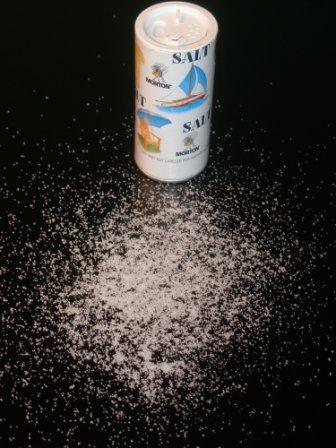Salt is the Hydration Key for Trail Running
Wednesday, March 11th, 2009 As it gets warmer outside it is time to start focusing on your hydration levels. I’m really into hydration. The most important thing that you need to remember is that hydration isn’t just drinking plenty of water, it’s your body being able to retain those fluids, this is where salt comes in. Get yourself some high quality NaCl.
As it gets warmer outside it is time to start focusing on your hydration levels. I’m really into hydration. The most important thing that you need to remember is that hydration isn’t just drinking plenty of water, it’s your body being able to retain those fluids, this is where salt comes in. Get yourself some high quality NaCl.
I didn’t always realize that salt was needed for hydration, I always assumed the opposite, that it dehydrates you. I quickly learned I was wrong while attending the US Army Ranger School. At Ranger School we were given salt packets to put into one of our canteens, the other canteen was to remain normal water. Even though we were in the hot South GA sun in the middle of summer, physically exerting ourselves for 18 hours a day, and eating so quickly that we only got small amounts of salt from our food, I thought I was smarter than the Army. I deduced that salt wasn’t good for me, it would dehydrate me. So I didn’t add the sea salt to my canteen. I went down hard for dehydration. At one point I became disoriented and was slurring my speech. For this I got about an hour of rest along with your temperature checked about 10 times rectally. Pretty fun but I don’t recommend trying it. So after that I began pounding the sea salt. This technique worked! From despair comes great innovation. Thanks US Army!
When you sweat (and urinate), you loose sodium which you need replenish in order to intake more fluids to hydrate. The more you sweat, the more sodium you loose. It’s just math. Mathematically, during long runs you sweat about 2.25-3.4 grams of salt per liter and about 1 liter per hour. Every body is different so you need to closely monitor your personal hydration levels. Some early signs of dehydration are nausea, muscle cramps, disorientation, slurred speech, confusion, and inappropriate behavior. Try to blame your inappropriate behavior on your low sodium levels next time. In order to avoid this happening you need to focus on the amount of salt you are taking in, especially before a long trail run. You should take about one gram of sodium per hour when on running long races. I like to get my salt intake from pretzels during a long trail run. Also start acclimating yourself to the heat during your training to help your body know better how to react to the loss of salt. The week before a trail race try to intake 10-25 grams of sodium per day. This will give you a good base going into your trail race. Lastly, you should avoid aspirin, ibuprofen, or other anti-inflammatories which decrease your sodium levels. Medicine’s for suckers anyways, headaches are cool.
So stop wasting your salt by throwing it all over your friend’s “game.” Save it for the trail race playa hata.


 The first time someone told me they had exercise induced asthma I said, “Yeah. Everyone has trouble breathing when they exercise. That’s what’s suppose to happen.” I equate exercise induced asthma diagnoses the same as ADHD diagnosis by saying the child has difficulty paying attention in class. Every kid has trouble paying attention in class, class is boring at that age. When I was in school my teachers used to tell my parents that I had trouble paying attention in class and determined it was because I was too smart for the speed of the normal classes; therefore, I did not pay attention. I may have had higher intelligence than my peers, but for instance, I didn’t already know my multiplication tables before attending class, they were just boring, that’s why I didn’t pay attention. Who needs multiplication tables anyways? I’m going to be a cartoonist when I grow up!
The first time someone told me they had exercise induced asthma I said, “Yeah. Everyone has trouble breathing when they exercise. That’s what’s suppose to happen.” I equate exercise induced asthma diagnoses the same as ADHD diagnosis by saying the child has difficulty paying attention in class. Every kid has trouble paying attention in class, class is boring at that age. When I was in school my teachers used to tell my parents that I had trouble paying attention in class and determined it was because I was too smart for the speed of the normal classes; therefore, I did not pay attention. I may have had higher intelligence than my peers, but for instance, I didn’t already know my multiplication tables before attending class, they were just boring, that’s why I didn’t pay attention. Who needs multiplication tables anyways? I’m going to be a cartoonist when I grow up!